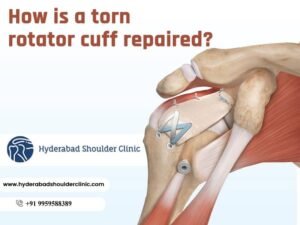The rotator cuff is a group of four muscles and their associated tendons that stabilize the shoulder joint and allow for a wide range of arm movements such as:-
- Helps with arm abduction (raising the arm).
- External rotation of the arm.
- Assists in external rotation.
- Responsible for internal rotation of the arm.
These muscles work together to keep the head of the humerus (the bone of the upper arm) securely in the shallow socket of the shoulder blade, known as the glenoid. The rotator cuff is important for activities that involve overhead movements and for maintaining shoulder stability. Injuries to the rotator cuff can lead to pain, weakness, and limited mobility in the shoulder.
Why would a rotator cuff repair be recommended?

A rotator cuff repair may be recommended for several reasons, especially when conservative treatments have not been effective. Some common reasons include:
- Tear of the Rotator Cuff: If there is a significant tear in one or more of the rotator cuff tendons, repair might be necessary to restore function and alleviate pain.
- Chronic Pain: Persistent shoulder pain that interferes with daily activities, work, or sleep may prompt a recommendation for surgery, particularly if it’s due to a rotator cuff injury.
- Loss of Range of Motion: Injuries to the rotator cuff can lead to significant limitations in shoulder movement. Repairing the injury can help restore normal function.
- Weakness in the Shoulder: If weakness in the shoulder limits the ability to lift or rotate the arm, surgery may be advised to regain strength and movement.
- Failed Conservative Treatments: If treatments such as physical therapy, medications, and corticosteroid injections have not provided adequate relief, surgery may be considered.
- Acute Injuries: In cases of acute injuries (like falls or accidents) that result in tears, surgical repair may be essential for proper recovery.
Overall, Dr.Chandra Sekhar B of Hyderabad Shoulder Clinic will evaluate the specific situation, including the severity of the tear, the patient’s age, activity level, and overall health, before recommending a rotator cuff repair.
Open surgery for rotator cuff repair in Hyderabad

Open surgery for rotator cuff repair in Hyderabad is a procedure designed to address significant tears in the rotator cuff when less invasive methods, like arthroscopy, may not be suitable. Here’s a general overview of the process:
- Anaesthesia: The surgery is typically performed under general anaesthesia, meaning the patient is asleep during the procedure. In some cases, a regional nerve block may be used to numb the shoulder area.
- Incision: The surgeon makes a larger incision (usually about 3-5 inches) on the outer side of the shoulder. This allows better access to the underlying muscles and tendons.
- Exposure of the Rotator Cuff: Once the incision is made, the surgeon carefully moves aside the muscles and tissues to expose the rotator cuff tendon and any damaged areas.
- Repairing the Tear: The surgeon then assesses the extent of the tear. The torn tendon is reattached to the humerus (the upper arm bone) using sutures or anchors made of materials like biocompatible plastic. This helps secure the tendon in its original position, allowing it to heal properly.
- Closure: After the repair is complete, the surgeon closes the tissue layers, and then sutures or staples are used to close the skin incision.
- Recovery: Patients typically spend some time in recovery before being sent home. Physical therapy is essential post-surgery and usually begins shortly after the operation to restore range of motion and strengthen the shoulder.
Open surgery tends to be indicated for larger or more complex tears, or in cases where previous surgeries have failed. Recovery time can vary based on the individual and the extent of the repair, but it generally takes several months to return to full function.
Advice from Dr.Chandra Sekhar B, of Hyderabad Shoulder Clinic regarding Open surgery for rotator cuff repair in Hyderabad

We at Hyderabad Shoulder Clinic give utmost importance to post-surgery care following an open rotator cuff repair. Dr.Chandra Sekhar B recommends the following steps:-
Immobilization: After surgery, your shoulder will typically be placed in a sling to immobilize and protect the area. You’ll need to wear this sling for several weeks, especially during activities like sleeping.
- Pain Management: Pain and discomfort are common after surgery. Your surgeon may prescribe pain medication or recommend over-the-counter options to manage pain. It’s important to take medications as directed.
- Ice Therapy: Applying ice packs to the shoulder can help reduce swelling and alleviate pain. Usually, it’s recommended to ice the area for 20-30 minutes at a time, several times a day during the first few days post-surgery.
- Wound Care: Keeping the surgical incision clean and dry is essential. Follow the surgeon’s instructions on how to care for the wound and watch for any signs of infection, such as increased redness, swelling, or discharge.
- Physical Therapy: Once cleared by your surgeon, physical therapy will likely begin. Therapy usually focuses on gentle range-of-motion exercises in the early stages, progressing to strengthening exercises as healing allows. It’s vital to follow the therapist’s guidance to prevent re-injury.
- Gradual Return to Activities: You’ll need to avoid heavy lifting, reaching, or activities that could strain the shoulder for several weeks. Your surgeon will provide guidelines on when you can gradually return to normal activities.
Schedule and attend follow-up appointments with us to monitor your healing progress. We will assess your shoulder and provide further instructions based on your recovery.
You might need to adjust daily activities and tasks for a while. It’s essential to listen to your body and avoid movements that cause pain. Every patient’s recovery will be different, so following specific advice from your healthcare team is critical for the best possible outcome. For more information, please visit our website https://hyderabadshoulderclinic.com/ or contact us at +91 9959588389 or shoulderandsportsclinic@gmail.com.





